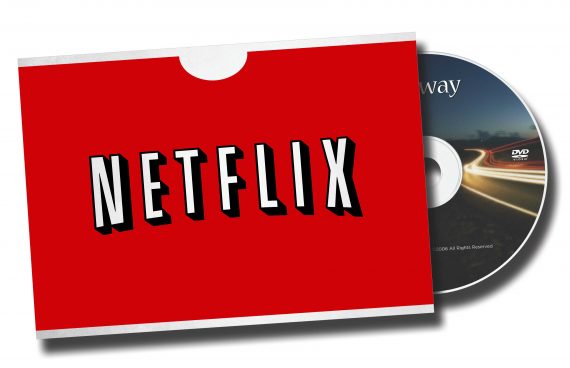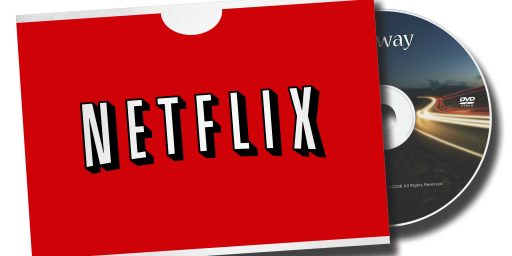What’s Really Behind The Netflix/Qwikster Split?
The decision to split Netflix into two companies makes no sense. Unless you look behind the scenes.
 As I note in a comment to James Joyner’s post, part of what Netflix/Qwikster is doing here seems to be related to the ongoing battle being waged by the Hollywood studios over online streaming:
As I note in a comment to James Joyner’s post, part of what Netflix/Qwikster is doing here seems to be related to the ongoing battle being waged by the Hollywood studios over online streaming:
Hollywood is a unique place, and understanding “business” in Silicon Valley leaves you ill-prepared to understand what makes Hollywood tick (for more on this see: When It Comes To Television Content, Affiliate Fees Make The World Go ‘Round). Very few people understand the key underpinning of the Netflix “original” business model — a 1908 Supreme Court Ruling known as “first sale doctrine.” From Wikipedia:
“The doctrine allows the purchaser to transfer (i.e., sell, lend or give away) a particular lawfully made copy of the copyrighted work without permission once it has been obtained.”
Because of the first-sale doctrine, any DVD reseller, including Netflix, can basically buy a DVD at WalMart, and turn around and rent it to someone else the very same day. The content owners have absolutely no control over whether the copy can be resold or rented. Period. As such, Netflix has the ability to rent (via DVD) any movie which has ever been sold on DVD, and its costs are relatively fixed as a result of the retail price of the actual DVD. In some ways, it is a perfect storm.
Fast forward to digital streaming and all bets are off. More specifically, the first-sale doctrine does not apply. That’s right. For DVDs, Netflix’s rights are unlimited and its costs are constrained. For digital, its rights are constrained and its costs are unlimited. In the absence of the first-sale doctrine, Netflix must negotiate each and every title, and the price of the right to stream that digital title is up to the whim of the content owner. For many titiles, you cannot even obtain digital rights, because they can’t find all the people the need to release the rights to do so.
So here is what I think happened with Netflix’s recent price change (for the record, I have no inside data here, this is just an educated guess). Netflix has for the past several years been negotiating with Hollywood for the digital rights to stream movies and TV series as a single price subscription to users. Their first few deals were simply $X million dollars for one year of rights to stream this particular library of films. As the years passed, the deals became more elaborate, and the studios began to ask for a % of the revenues. This likely started with a “percentage-rake” type discussion, but then evolved into a simple $/user discussion (just like the cable business). Hollywood wanted a price/month/user.
This is the point where Netflix tried to argue that you should only count users that actually connect digitally and actually watch a film. While they originally offered digital streaming bundled with DVD rental, many of the rural customers likely never actually “connect” to the digital product. This argument may have worked for a while, but eventually Hollywood said, “No way. Here is how it is going to work. You will pay us a $/user/month for anyone that has the ‘right’ to connect to our content – regardless of whether they view it or not.” This was the term that changed Netflix pricing.
With this new term, Netflix could not afford to pay for digital content for someone who wasn’t watching it. This forced the separation, so that the digital business model would exist on it’s own free and clear. Could Netflix have simply paid the digital fee for all its customers (those that watched and not)? One has to believe they modeled this scenario, and it looked worse financially than the model they chose.
If this is what’s going on behind the scenes, then most of what’s been going on with Netflix over the past several months starts to make a lot more sense. The pricing changes that caused so much controversy when they occurred were likely Netflix’s attempt to narrow down its population of streaming customers to only those that are actually using the service (since that’s how the studios are charging them). And splitting the company into DVD and streaming-only independent operations brings that population down even further. Some people will probably sign up for both services, but only the ones that are really interested in using the streaming service, thus reducing the total costs Netflix incurs with the studios. Netflix could have explained all of this better, I think. Heck, if they really wanted to, they could have made the studios out to be the bad guys. I imagine that the only reason they didn’t is that because, in the end, the content owners are in a far better position to dictate terms and without the content, the streaming service is meaningless.
Of course, much of this could be fixed, to the benefit not just of the business model of Netflix, Amazon (which offers its own online streaming service), and the cable companies, but also consumers. Congress could step in and clarify how online streaming applies to the copyright issues that this brings up, perhaps by applying a version of the First Sale doctrine to online streaming. Congress, though, seems firmly in the pocket of the big studios (the AMPAS lobbying operation in Washington in one of the most sophisticated) so it seems unlikely that anything will happen there. The original First Sale Doctrine came about because of a Supreme Court case, but I’m not at all sure how a case could be developed to challenge the studios here. For the reasons noted above, I doubt Netflix would be willing to roll the dice on litigation. That’s bad for consumers, and it’s bad for the innovation that would be created by opening up the massive online libraries of the movie studios to the world of online streaming.
This Netflix issue isn’t just about a business decision, then. It’s about how our Copyright Laws, which are authorized under Congressional authority to “promote science and the useful arts” are holding back technology yet again thanks to the lobbying strength of copyright holders.






That makes sense! Netflix still handled it badly however. It worked out well for me – I am hearing impaired and need CC or subtitles so streaming doesn’t work for me.
That makes a lot of sense. I’ve heard about the issues with “First Sale” caused by Netflix’s shift to streaming, but I didn’t put it together with pressure from the content holders to understand why they were spinning off their DVD rental business.
@Doug Mataconis
I’m not sure what form that would take, since traditional “First Sale” rights applied to streaming might mean that companies could buy a single DVD copy, then stream it an infinite number of times. If they have to buy it on a basis of “one copy = one copy available to stream”, then that might actually be good for the Blu-Ray/DVD market. On the other hand, if a company can stream a DVD’s content to as many people as they want, then it’s the death of that market. The studios would have to move entirely into streaming and the sale of online “licenses” to view content, and end any sales of physical copies of their content.
A ruling that customers have the right to watch a digital copy of their DVD/Blu Ray on any devices they own would be nice, though. Some DVDs have offered that in the past, with a digital copy activation code that comes with the DVD (although you have to do it in a limited time period).
@Ron Beasley: My hearing is fading so I find the CC option useful at times, too. NETFLIX, though, is increasingly offering CC options for some of their streaming stuff. You might keep an eye out for it.
I find that I use the streaming service more than the DVDs just now. Not only is my monitor bigger than my non-HD TV, but I don’t have to wait even the two/three days it takes for DVDs to cycle. I’ve got a NETFLIX depot about 50 miles away, but the electrons move faster than the USPS.
@John Burgess: I really haven’t had a problem with USPS here in the Portland area. There are simply not enough with CC option to make it worthwhile.
I don’t consider two-day delivery bad at all. It’s just that the streaming takes all of five seconds to start the delivery.
I do wish more programs were closed captioned, though, both streaming and on DVD. Maybe I’d do better if I decided to read the captions in French or Spanish.
Pretty insightful post and I think you are right. What worries me as a consumer is that I think eventually the content owners are going to push up the prices of content acquisition so high that eventually it will cost as much to subscribe to Netflix and Hulu as it does cable tv. At that point they lose their advantage. Although I will say this, I prefer Netflix and Hulu to cable because I watch what I want, when I want it. I would drop cable tomorrow except for one channel, ESPN. Now if they smartened up they would allow people to subscribe to them directly rather than using the cable company as a middle man.
Great article… I also would guess that the studios (if they are anything like the music industry) probably has problems with their content existing under the same ‘roof’ given the ability to copy and duplicate the physical media/DVDs — a potential huge source for piracy.
The $/user/month thing explains why they separated the plans, but I don’t see why it would force Netflix to essentially split into two companies.
This makes sense but Netflix obviously doesn’t know the first thing about negotiating or customer relations. Protecting the studios in any way does nothing to server their purposes particularly when they have a virtual monopoly on DVD rentals and piss poor streaming selection (read – nothing to lose).
Netflix first off should have explained itself better and not pissed off its installed base of customers (Marketing 101). The studios are the bad guys here and they should have explained it as such up front and forced the studios to at least attempt a way to save face even if a long shot.
Their DVD rental business is their leverage. It’ll be around for a while until the USPS goes bust. They should have made it MORE attractive to rent if the studios didn’t cooperate and less enticing if they had. Studios want to increase their push into the homes with streaming content? Give Netflix what they want.
Instead what Netflix did is annoy everyone, look ridiculous in their explanations and destroy whatever good will they had with the brand.
The only explanation for any of this is incompetence.
An interesting idea, and looking at Netflix/Qwikster through this lens does help explain some of the recent moves.
I wonder though, why Amazon provides streaming movies/tv to all Amazon Prime customers, many of which, presumably, don’t use it. It seems like Amazon is trying to gain as many potential customers as possible by bundling with Prime, while by you rational, Netflix is trying to limit the number of customers.
A small factual problem with the quoted passage early in the article, namely:
Not true. Retail DVDs are licensed for home use only, not for rental. Just like software, you own the media but are limited in how you can use it by the license. The studios also control the price they sell such discs to rental outlets (many times the retail cost), even though they are physically the same discs.
So while the difference in licensing terms is definitely a (if not the) significant factor, the Content Cartel has already dealt with the First Sale Doctrine in the U.S.
That makes sense for charging separate fees. But still doesn’t explain splitting the service in two.
Also, any idea why it’s problematic to stream the output of one DVD player to one customer over a virtual private network?
That seems logical … but studios don’t charge that way. Every major NFLX deal to date is a flat annual fee, irrespective of the number of users. This is one of the reasons why there aren’t any major competitors to Netflix — you need a critical mass of subscribers to make it work.
Perhaps the studios are changing their pricing model, but everything I’ve heard suggests that this isn’t in the cards soon.
@Anthony — RedBox was buying DVDS to rent in its boxes for quite some time. Maybe those licenses did exist, but I don’t think their legally enforceable.
This has to be it. It’s not like we haven’t seen the movie studio and cable companies and others make such greedy moves. They apparently haven’t learned the lesson they learned with iTunes. Give people an easy, inexpensive way to get media and they won’t steal.
All the lawsuits against “pirates” are going to do is drive it more underground and secretive, so that people figure out an undetectable way to watch what they want free.
In that scenario, everyone loses.
How does it make sense?
1) This argument is old. In fact this particular version dates to before the July announcement. People have known about the DVD first sale argument vs. streaming rights for decades. In fact, this is the reason Netflix started as a DVD-by-mail business in the first place.
2) The article implies that that contracts last a year. There are actually overlapping contracts here with each copyright holder and content provider (Starz, Disney, Sony Pictures, etc.). Given this lead time, they could have certainly split the services separately of any price increase. They did not.
3) If the streaming service is the costly one, then why are they being punished the least? Right now, the streamer can remove their DVD subscription and get a price discount.
4) What does separation of the streaming and DVD services have anything to do with a separation of the business units into two companies. The former is like Amazon removing free streaming from Prime; the latter is like Amazon creating a books-by-mail company called Bookster because a lot of people are buying books on their Kindle.
5) In what way does the consumer benefit. Remember these leaks were cast as messages (and later apology) to the consumer. From the consumer perspective none of this stuff is mitigating. When is it our job, as a customer of Netflix, to carry the corporate water for their mistake? Furthermore, the “apology” was not one at all: It never acknowledged the mistake (it just apologized for not informing the customer better), none of this argument was brought up in it, it compounded the previous with inconvenience (double queues, double billing, two websites, and even more customer confusion), and offered nothing but platitudes (to use the above comments, instead of saying “We need to focus on rapid improvement as streaming technology and the market evolves, ” add at least one thing specific: for instance saying “We plan on improving streaming services by adding closed captioning”).
In other words, legal and financial reasons may mean eventually Netflix would have to bring their users down to the reality that streaming is a lot more expensive than they are charging. But it doesn’t defend their business and PR stupidity. Netflix basically called their customers cheapskates and said that because they voted with their $, they are going to punish them by splitting your company in two.
http://terrychay.com/article/tilting-the-netflix-windmill.shtml
Forgot
6) Why are we blaming the content holders? The content holders are raising streaming prices because demand to stream their content is increasing. ANY company would do the same if demand for their products was going up.
We may have a problem with copyright law allowing to create artificial scarcity (BTW, I do too), but that is another discussion. Right now some are just rooting for tech companies (Apple, Amazon, Microsoft, Blockbuster, Hulu, and Netflix) and against the content creators (Disney, Time Warner, NewsCorp, and Sony) just because they’re not part of “their team.” In the big scheme of things both sides are sociopathic, neither side needs anyone to carry their water, and the copyright law is an argument for a different time.
Exactly what species of Panda is Reed Hastings that he needs to be protected by the government? If Netflix can’t cut it in Hollywood, they should get out.
Netflix and Amazon SHOULD be in an inferior bargaining position to content creators. There is no shortage of video distributors now. We have ISO MPEG4, HTML5, and HTTP live streaming … anyone can set up their own online video distribution these days with a very limited budget, and even with no budget, you can use YouTube. But what *is* there a shortage of? Content … especially great content. Yes, the people who created and maintain that content are in the superior bargaining position. Again, this is as it should be. If not, then we might as well go back to TV and keep canceling Star Trek in its 3rd season because Westerns are suddenly back in vogue.
Whether there will be content aggregators like Netflix in the future is still an open question. For all we know, the Web may get micropayments and we’ll just find Toy Story 3 at disney.com/toy/story/3 and it’s $0.001 per second or something like that, and you can connect via any browser or mobile or set-top thanks to HTML5, ISO MPEG4, HTTP live streaming. A movie is just a Web page now.
So Netflix and Amazon are going to have to prove they have a reason to exist in an all-digital world. They are online DVD and book sellers, they ship physical goods. The expectation in a transition to all-digital is that Netflix and Amazon would go out of business, not that they would become rulers of all media. Doesn’t matter if they are favorite pets of computer nerds.
Understand that HTML5, ISO MPEG4, and HTTP live streaming combine to make a “virtual DVD.” Instead of the DVD platter, the transport medium is HTTP (the Web protocol.) Instead of the MPEG2 movie on the DVD, we have the newer MPEG4 movie that shows higher quality in much less bandwidth, making it suitable Internet delivery. Instead of the DVD player interface, which is an awful mishmash of non-square pixels and masking regions that is a pain in the ass to author — and via remote is a pain in the ass to use — we have HTML5 interfaces, with which one can create one interface that scales from iPod up to 60 inch TV, and using free Web development tools and standard Web development techniques. So we do not necessarily need a middle man to deliver DVD’s to us anymore. Same as the Web obsoleted AOL. You didn’t go “AOL Keyword: Coca-Cola” anymore, you just went to cocacola.com. Netfix and Amazon could easily be the next AOL. It’s up to them to prove that they are not. Without any endangered species protection by the government. They are not beautiful Pandas.